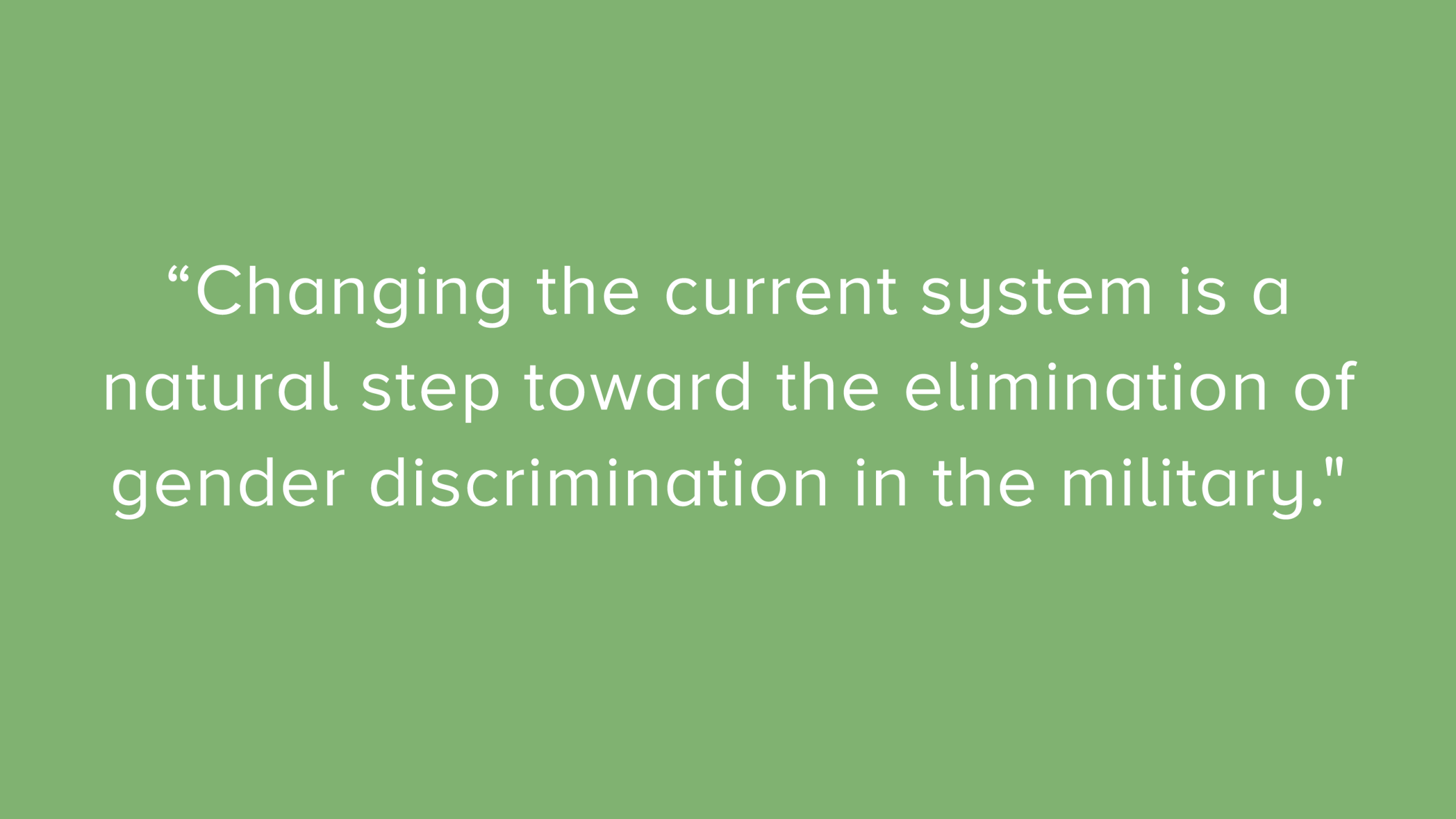
The debate about whether women should be required to register for Selective Service and the misguided commentary surrounding it has made one thing clear: Many senior leaders are out of touch with the attitudes of younger Americans. I think this younger generation believes that changing the current system is a natural step toward the elimination of gender discrimination in the military and the establishment of a level playing field for citizenship in America.
The proponents of keeping women in traditional roles assume that requiring us to register for the draft will create such a hue and cry from the public that it will cause officials to reconsider the wisdom of allowing women to serve in combat.
Read more: How to Improve the Lives of Female Soldiers
But such comments are highly emotional at best, and at worst, they demonstrate the same benevolent sexist tendencies that have prevented American women from having equal job opportunities and equal pay for decades.

Many men (and women) of a certain era believe that women need to be protected by men because we are not emotionally or physically capable of looking after ourselves. But such individuals fail to comprehend that, in seeking to shelter women from the evils of the world, they deny women the opportunity to succeed in every aspect of society. They also fail to consider that, since the Revolutionary War, women have served in combat “under the radar” and that we possess more ability to successfully wage battle than we are routinely given credit for.
Of all of the services, the Marine Corps has been the most pedantic when it comes to diversity and cultural evolution. From racial desegregation to the abolition of “Don’t Ask, Don’t Tell” and now the integration of women into ground combat jobs, the service has historically been the slowest to embrace change.
Over the past 12 months, the online commentary from current and former Marines has revealed significant fault lines in how male Marines perceive and treat female Marines. While I was the commanding officer of the only all-female unit in the Marine Corps, I experienced incredible pushback from my superiors when it came to trying to improve the performance of my recruits and Marines. I felt my superiors were quick to apply much harsher evaluative leadership criteria to me than to my male counterparts. Their characterization of me as an abusive leader was a clear example of the damned if you do, damned if you don’t scenarios women experience every day in both the military and civilian sectors. (I was fired after being characterized as “mean” by Marines I was simply holding accountable—an expectation for any leader in the Corps.)
These polarized perceptions and “competent but not liked” biases that strong female leaders in the military face illustrate why removing all barriers will be critical to true equality. This is especially true as it relates to the Selective Service, and it is a step in the right direction that the Commandant has publicly recognized that a change to the policy will be necessary in the near future if integration is to be a success.
Read more: ‘We Need to Change the Way We Think About Feminism’
There’s no shortage of anecdotal evidence suggesting that senior leaders are out of touch with young men and women who recognize that being drafted is part of the obligation of citizenship.
More importantly, many young women agree that women can’t have it both ways—we can’t demand equality on one hand but say we should be excused from the draft solely because of our gender on the other.
From desegregation to the abolishment of discriminatory practices against homosexuals, societal change often begins with the military. If we want to eradicate the wage gap and shatter the glass ceiling once and for all, we must also abolish any regulations that perpetuate gender discrimination, especially those that work to our disadvantage, like the current exemption from the draft.
Read more: The Best Way to Bounce Back From Any Setback
Our ability to eliminate gender discrimination in both the military and civilian sectors hinges directly upon our willingness as 51% of the total population to assume our fair share of the responsibility for things like our national defense. Our credibility is at risk otherwise.
Kate Germano is a 20-year veteran of the Marine Corps who will retire from active duty July 1, 2016.
More Must-Reads from TIME
- Donald Trump Is TIME's 2024 Person of the Year
- Why We Chose Trump as Person of the Year
- Is Intermittent Fasting Good or Bad for You?
- The 100 Must-Read Books of 2024
- The 20 Best Christmas TV Episodes
- Column: If Optimism Feels Ridiculous Now, Try Hope
- The Future of Climate Action Is Trade Policy
- Merle Bombardieri Is Helping People Make the Baby Decision
Contact us at letters@time.com